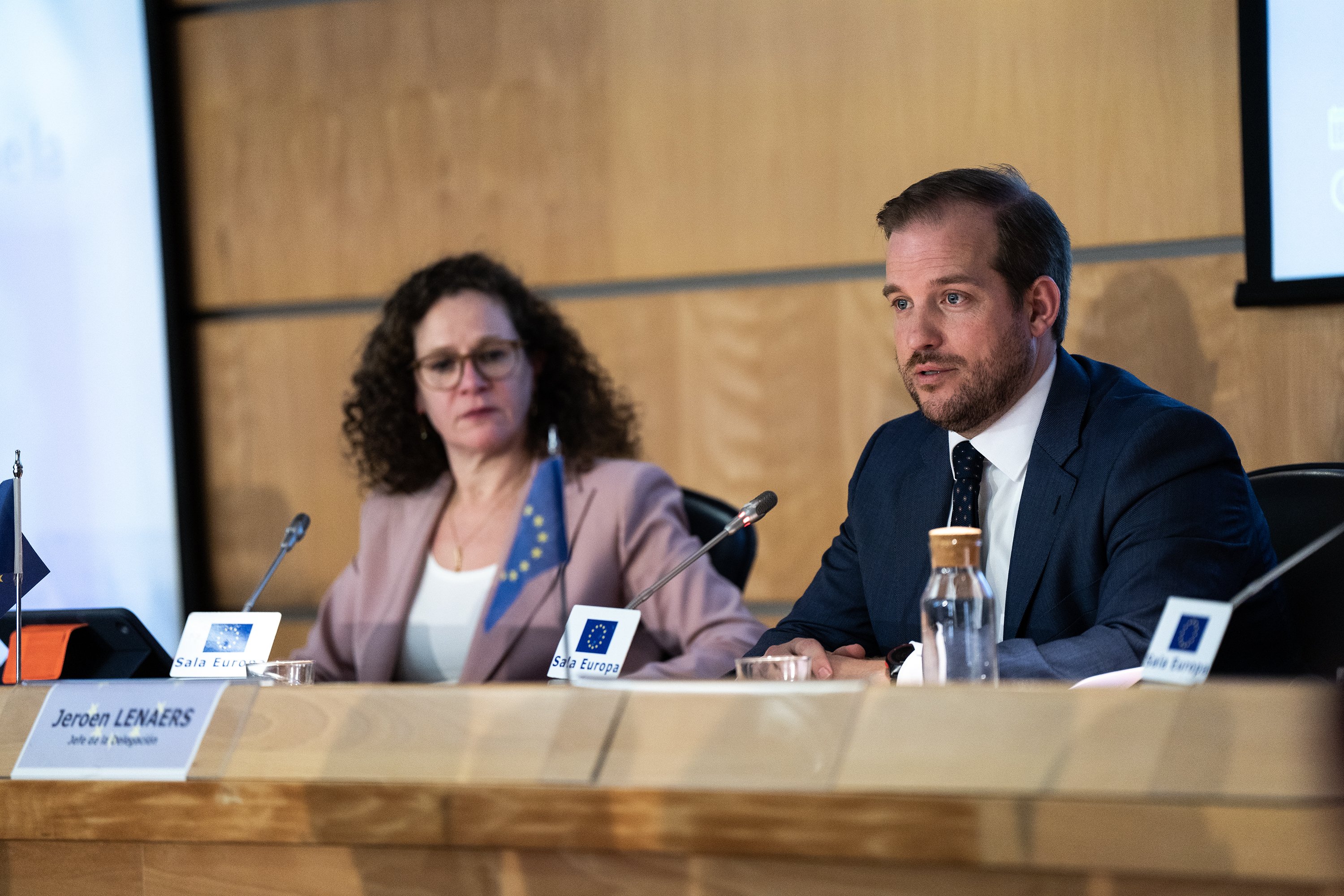The European parliamentary delegation that has visited Madrid this Monday and Tuesday to find out what happened in the cases of the Pegasus spyware infections linked to the Spanish state leaves the capital with the feeling that the Pedro Sánchez government could have provided more information on the espionage cases it came to investigate. "We have not received significant information," said the committee's rapporteur, Sophie In'T Veld, in a press appearance this Tuesday from the headquarters of the European Parliament in Madrid, where she appeared together with the president of the working group, the Dutch People's Party representative Jeroen Lenaers. They found it "disappointing" that they were not able to meet with more representatives of the Spanish government, commenting that they would have been "grateful" to have met the minister for the PM's department, Félix Bolaños, to get to the bottom of the matter.
However, the committee let the Spanish government off the hook for having sent a secretary of state, Pascual Navarro, to the official appointment this Monday. "That is better than nothing," Lenaers asserted, adding that in "Hungary and Poland, the government authorities did not meet us." Similarly, the delegation said it understood "the circumstances" that have been experienced in Madrid these two days - Monday was a holiday and on Tuesday, the Congress has begun considering a motion of no-confidence. In this regard, realizing that they came "at a difficult time", the MEPs believe that these two circumstances of the calendar "have not harmed the vision".
From the meeting with secretary of state Navarro, they reported that they have urged the Spanish government to activate legislative reforms to "improve transparency" and referred to the reform of the Official Secrets act and the framework that governs the CNI intelligence service, two legislative modifications that are currently stranded. "We believe that they are on the right track, although we will have to see how quickly they move, taking into account that elections are close," said the report's rapporteur. A conversation that she asserted would have been more profitable with the minister Bolaños. The liberal MEP took the opportunity to defend the credibility of Citizen Lab in the face of criticism received from People's Party and PSOE representatives. "The accusations of bias have been duly refuted. Citizen Lab acts with academic criteria and has been the source of information," she stressed, while also noting that countries have to provide methods to have "forensic examination systems" to check the evidence of infections for which "the help of Europol would be very useful".
Denial of a "boycott attitude"
Despite the complaints, the two MEPs denied a "boycott attitude" on the part of the Spanish authorities throughout the mission. In fact, they excused Congress for suspending one of the key meetings scheduled for today, that of the Congress's Defence and Official Secrets committee, the parliamentary organs which act as control mechanisms for the CNI - a cancellation which outraged the pro-independence parties. "Knowing that it would be a difficult debate", Lenaers assured that they will look for "another occasion to hold a meeting via digital means between the delegation and the committee". "There was a will to meet with us", assured the president of the MEP group, who defended, against the criteria of the French MEP of the Left, Anne Sophie Pelletier, that "the organization has not been easier or more difficult than on other missions".
The two spokespeople also gave something of a wake-up call to the pro-independence espionage targets with whom they met. "We are not here to express any position favourable to independence", suggested the president of the committee, affirming that his job is to guarantee that "the legal framework in Spain complies with the protection of fundamental rights". On this point, he stated that the victims of espionage "need more information and more transparency", while he wished that "confidence could be created in the courts" over their investigation of the complaints filed.
Specific questions that were not answered
In conclusion, the committee stressed that "the use of and commerce in this espionage in the European Union must be regulated." "It is an attack on democracy," In'T Veld denounced, considering that it is "a tool that cannot be used at will, but rather only for exceptional cases when there is a very clear and imminent danger to national security," she said. In this regard, in the report they will encourage the Spanish state to "reflect a better definition of national security, it is too broad", which is the argument which allows the espionage to be justified.
Sophie In'T Veld also raised a number of specific questions that the committee's visit has failed to answer about Spain's Pegasus use. For one, she pointed out, "the fact that the hacks were considered legal but no charges were brought against the people targeted leaves open too many questions." On the other hand, if the surveillance of the Catalan politicians, lawyers and others was legally authorised, why, she asked "did it trigger the resignation of the head of the CNI, and a reform of its legal framework? We need clarity from the authorities".
In'T Veld was also critical of the Spanish Ombudsman's position, backing the government's action in the 18 cases known to have been authorised - but, said the rapporteur, he "assessed the cases only for procedural legality, not for proportionality". Finally she noted that "for 47 cases there is no explanation at all, leaving the victims without any recourse". The European committee strongly recommends that "Europol be invited by the Spanish authorities to assist with the forensic examination of the devices."
Now the committee is in the process of negotiating the conclusions of its report, after also visiting Hungary, Cyprus, Israel, Greece and Poland.

